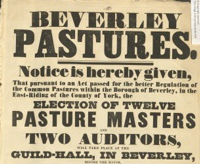
In the 1830s, towns in England and Wales went through a series of dramatic changes of governance. Two were driven by famous pieces of legislation: the 1832 Reform Act, which reconstructed urban Parliamentary franchises; and the 1835 Municipal Corporations Act, which recast civic government. The third was the significant reorganisation of civic space and property rights, which followed as an unintended consequence of these Acts. My recent Social History article shows that by changing who was represented, and how civic government was constructed in over 100 towns and boroughs, these acts restructured freemen’s (and their widows’) rights to corporate property, sometimes extinguishing rights to urban lands that had been possessed in common for centuries, and sometimes recasting the complicated political relationships that had grown up around these rights.[1] Continue reading


